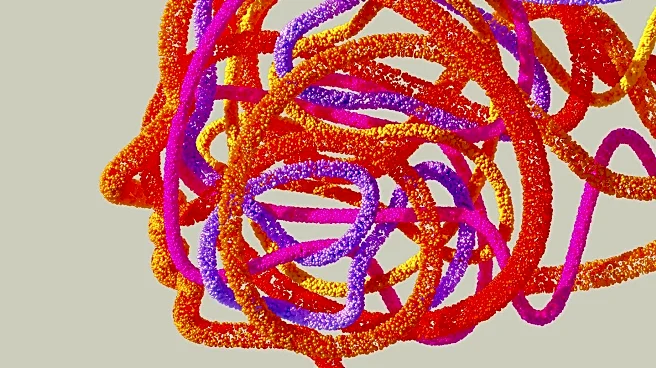What's Happening?
Recent studies have highlighted the significant role of gut microbiota in influencing neurodevelopmental and neuropsychiatric disorders. The research focuses on the bidirectional communication between gut microbiota and brain cellular compartments, which may impact conditions such as autism spectrum disorders (ASD), ADHD, depression, schizophrenia, and neurodegenerative diseases like Alzheimer's and Parkinson's. The gut microbiota can affect neurotransmitter production and metabolic pathways, potentially contributing to the pathophysiology of these disorders. For instance, altered gut microbiota composition has been linked to increased gut permeability in ASD, affecting neurobehavioral outcomes. Similarly, changes in gut microbiota may influence dopamine production and neurogenesis in ADHD, impacting symptoms of inattention and hyperactivity.
Why It's Important?
Understanding the gut-brain axis is crucial for developing new therapeutic strategies for neurodevelopmental and neuropsychiatric disorders. The gut microbiota's influence on neurotransmitter pathways and neuroinflammation suggests potential interventions targeting gut microbiota to alleviate symptoms and improve quality of life for affected individuals. This research underscores the importance of considering gut health in the context of mental health and neurological disorders, offering insights into the complex interactions between gut microbiota and brain function. The findings could lead to innovative treatments that modulate gut microbiota to support neurological health.
What's Next?
Further research is needed to elucidate the mechanisms by which gut microbiota alterations contribute to neurodevelopmental and neuropsychiatric disorders. Studies may focus on distinguishing microbiome changes due to diet from those directly contributing to these conditions. Potential therapeutic interventions targeting gut microbiota could be explored to improve symptoms and quality of life in individuals with disorders like ASD and ADHD. Additionally, understanding the gut microbiota's role in neurodegenerative diseases may lead to novel treatment approaches for conditions such as Alzheimer's and Parkinson's.
Beyond the Headlines
The ethical implications of manipulating gut microbiota for therapeutic purposes warrant consideration. As research progresses, it is essential to address potential risks and benefits of microbiome-based interventions. The cultural dimensions of dietary habits and their impact on gut microbiota composition should also be explored, as they may influence the effectiveness of treatments. Long-term shifts in public health policy could arise from a deeper understanding of the gut-brain axis, potentially leading to preventive measures and lifestyle changes that support neurological health.









